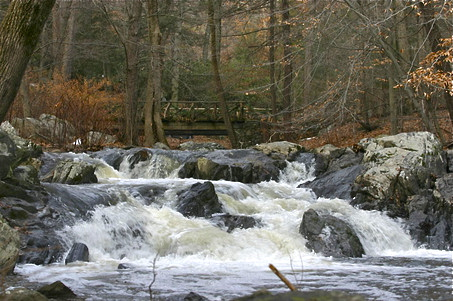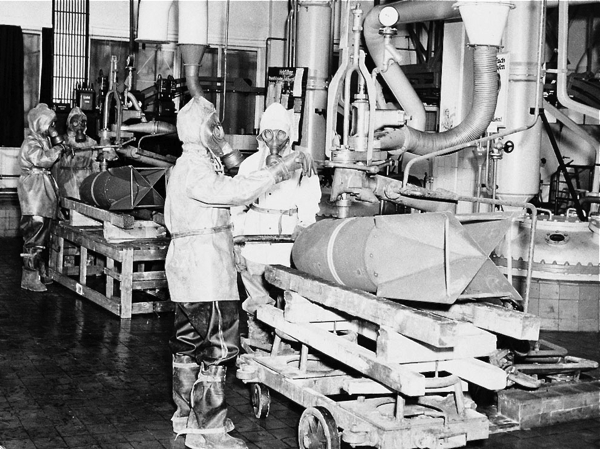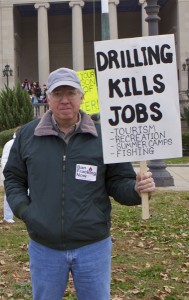
Pocantico River – North Tarrytown, NY. Site of Washington Irving’s classic story:”The Legend of Sleepy Hollow”
[Update: 12/7/11: check out both a remarkable resonance and a remarkable moment. Philip Glass spoke to the OWS at Lincoln Center. There is an echo of themes from the below post. The moral of the below post was about literature, sounds, and our discovery of virtue.The “machine” can “occupy” the “garden”, and encroach on intellectual and artistic space (i.e the pastoral ideal). I believe in the need to restore notions of republican virtue and the public interest. Here is what Glass said, the closing lines in the play Satyagrapha: watch the episode:
“When righteousness withers away and evil rules the land, we come into being, age after age, and take visible shape, and move, a man among men, for the protection of good, thrusting back evil and setting virtue on her seat again.”
Of Chainsaws and Virtue – My “Sleepy Hollow Moment”
I often have “Sleepy Hollow moments” – and am sure you do too.
What the hell is a “Sleepy Hollow moment” you say?
Bear with me as I explain and we explore the meaning.
I’m sure you’ll agree that there’s some powerful and important stuff going on here.
The Sleepy Hollow Moment defined
I hate chainsaws.
They are loud, destructive, and dangerous. Operating one absolutely terrifies me.
Following in the footsteps of the axe, chainsaws – by orders of magnitude – have aided the destruction of countless acres of magnificent forests.
Nothing – save an all terrain vehicle or the blast of a shotgun – can more completely destroy a tranquil walk in the woods.
Chainsaws are an almost perfect symbol of what Leo Marx wrote about in his masterpiece on the technological sublime and the pastoral ideal: The Machine in the Garden – Technology and the Pastoral Ideal.
Marx (no relation to Karl), prefaces that superb book with a quote from Washington Irving’s 1820 tale “The Legend of Sleepy Hollow” (I’m an Irving homeboy, from Tarrytown NY, a graduate of Sleepy Hollow High School):
I mention this peaceful spot with all possible laud; for it is in such little retired valleys that population, manners and customs remain fixed; while the great torrent of migration and improvement, which is making such incessant change in other parts of this restless country, sweeps by them unobserved. They are little nooks of still water which border a rapid stream (Irving – 1820)
At the outset of the book, Marx distinguishes two very different forms of American pastoralism – the first he calls “popular and sentimental”, the second “imaginative and complex”.
The sentimental version is nostalgic: “a flight from the city”:
An inchoate longing for a more “natural” environment” enters into the contemptuous attitude that many Americans adopt toward urban life (with the result that we neglect our cities and desert them for the suburbs). Whenever people turn away from the hard social and technological realities, this obscure sentiment is likely to be at work. We see it in our politics, in the “localism” invoked to oppose an adequate system of national education, in the power of the farm block in Congress, in the special economic favor shown to “farming” through government subsidies. It manifest itself in our leisure activities, in the piety towards the out-of-doors expressed in the wilderness cult, and in our devotion to camping, hunting, fishing, picnicking, gardening, and so on.
Marx concludes that this sentimental form is:
generated by an urge to withdraw from civilization’s growing power and complexity. What is attractive in pastoralism is the felicity represented by an image of a natural landscape, a terrain either unspoiled or, if cultivated, rural. Movement towards such a symbolic landscape also may be understood as a movement away from an “artificial” world -¦ away from sophistication towards simplicity – away from the city towards the country – a vehicle of escape from reality.
Marx then contrasts this sentimental form of the pastoral with his “imaginative and complex” form. But he doesn’t use a specific definition or criteria, instead he relies on an illustration from a passage by Nathaniel Hawthorne.
Marx develops what he calls “the Sleepy Hollow moment” or motif. To do this, he refers to Hawthorne’s own experience of a place called “Sleepy Hollow“.
The signal event transpires on the morning of July 27, 1844 in the woods near Concord, Massachusetts.
Hawthorne’s notes of that day set out to describe a tranquil moment. Marx interprets the larger significance:
he [Hawthorne] sat in solitude and silence and tried to record his every impression. One incident dominates his impressions. Around this “little event” a certain formal – one might say almost dramatic – pattern takes shape. It is to this pattern that I want to call attention.[..]
Hawthorn is using natural facts metaphorically to convey something about the human situation. From several pages in this vein, we get an impression of a man in almost perfect repose, idly brooding upon the minutia of nature, and now and then permitting his imagination a brief flight. Hawthorne is satisfied to set down unadorned sense impressions, especially sounds – sounds made by birds, squirrels, insects, and moving leaves.
But then, after a time, the scope of his observations widens. Another kind of sound comes through. He hears the village clock strike, a cowbell tinkle, and mowers whetting their scythes.
Without any perceptible change of mood or tone, he shifts from images of nature to images of man and society. He insists that “these sounds of labor” do not “disturb the repose of the scene” … He is describing a state of being where there is no tension either within the self or between the self and its environment. Much of this harmonious effect is evoked by the delicate interlacing of sounds that seem to unify society, landscape, and mind. What lends most interest, however, to this sense of all encompassing harmony and peace is a vivid contrast:[Marx excerpts excerpts Hawthorne]
But, hark! there is the whistle of the locomotive – the long shriek, above all other harshness, for the space of a mile cannot mollify it into harmony. It tells a story of busy men, citizens, from the hot street, who have come to spend a day in a country village, men of business; … and no wonder that is gives such a startling shriek, since it brings the noisy world into the midst of our slumbrous peace. [end Hawthorne]
[..]
There is something arresting about the episode: the writer sitting in his green retreat dutifully attaching words to natural facts, trying to tap the subterranean flow of thought and feeling and then, suddenly, the startling shriek of the train whistle bearing in upon him, forcing him to acknowledge the existence of a reality alien to his pastoral dream. What begins as a conventional tribute to the pleasures of withdrawal from the world – a simple pleasure fantasy – is transformed by the interruption of the machine into a farm more complex state of mind.
Our sense of its evocative power is borne out by the fact that variants of the Sleepy Hollow episode have appeared everywhere in American writing since the 1840’s. We recall the scene from Walden where Thoreau is sitting rapt in a revery and then, penetrating the woods like the scream of a hawk, the whistle of the locomotive is heard; or the erie passage in Moby Dick where Ishmael is exploring the innermost recesses of a beached whale and suddenly the image shifts and the leviathan’s skeleton is a New England textile mill; or the dramatic moment in Huckleberrry Finn when Huck and Jim are floating along peacefully and a monstrous steamboat suddenly bulges out of the night and smashes straight through their raft. More often than not, the machine is made to appear with startling suddenness.
[…]
What I am saying – is that Hawthorne’s notes mark the shaping of a metaphorical design which recurs everywhere in our literature. They are a paradigm of the second kind of pastoralism mentioned at the outset. By looking closely at the way these notes are composed we can begin to account for the symbolic power of the “little event” in Sleepy Hollow”
[…]
Since Jefferson’s time the forces of industrialization have been the chief threat to the bucolic image of America. The tensions between the two systems of value had the greatest literary impact in the period between 1840 and 1860, when the nation reached that decisive stage in its economic development which W.W. Rostow calls the “take-off”… In America, according to Rostow, the take-off began about 1844 – the year of the Sleepy Hollow episode – just at they time our first significant literary generation was coming to maturity. … The locomotive appears in the woods, suddenly shattering the harmony of the green hollow, like a presentiment of history bearing down on the Amercian asylum. The noise of the train… is a cause of alienation …. and so it estranges [Hawthorne] from the immediate source of meaning and value in Sleepy Hollow. In truth, the “little event” is a miniature of a great – in any ways the greatest -event in out history.
That Hawthorne was fully aware of the symbolic properties of the railroad is beyond question. Only the year before he had published “The Celestial Railroad”, a wonderfully compact satire on the prevailing faith in progress.
[…]
In its simplest, archetypal form, the myth affirms that Europeans experience a regeneration in the New World. They become new, better, happier men – they are reborn. In most versions the regenerative power is located in the natural terrain: access to undefiled, bountiful, sublime Nature is what accounts for the virtue and special good fortune of Americans. It enables them to design a community in the image of a garden, an ideal fusion of nature with art. The landscape thus becomes the symbolic repository of value of all kinds – economic, political, aesthetic, religious.
The sudden appearance of the machine in the garden is an arresting, endlessly evocative image. It causes the instantaneous clash of opposed states of mind: a strong urge to believe in the rural myth along with an awareness of industrialization as a counterforce to the myth.
My Sleepy Hollow Moment
So, with Marx’s observations in mind, let me rehash my own recent “Sleepy Hollow moment”, and suggest productive avenues of future pursuit.
As I sat on the porch with a contented dog and sipping coffee, it was the incessant whine of the chainsaw that broke the moment and drew me to the woods behind my house on an otherwise fine Saturday morning.
Those woods are preserved and adjacent to a State Wildlife Management Area.
So, could my disruptor of the peace be so bold as to be poaching wood too?
My mind ran wild and my blood began to boil, as I set out into the woods, in the direction of the racket.
Upon arrival, I met “Mr. G”.
No confrontation – after a brief conversation, it was clear that he was no defiler of nature or poacher of wood, but a gentle man of virtue.
I immediately discovered that Mr. G. was a volunteer trail builder.
When I asked Mr. G about his volunteer work, he began by noting that although not many people now hiked in these recently preserved woods.
But he quickly emphasized that “people 50 years from now sure will appreciate this trail“.
Yes, surely Mr. G: “these sounds of labor” do not “disturb the repose of the scene” – “sounds that seem to unify society, landscape, and mind”.
And therein lies the moral of our tale of our Sleepy Hollow moment:
Our discovery of virtue: consideration for the future, the wellbeing of the landscape and natural world, and selfless work in the public interest.

Mr. G.
So what went so wrong historically?
Why is the relation between technology and the garden so screwed up today?
To probe those questions, next time, we being that exploration, based on the work of historian Joyce Appleby (“Capitalism and a new social order“).
We focus on Appleby’s analysis of how the concept of virtue was redefined and perverted in the 1790’s.
Virtue was redefined: from Classical republic virtue defined as selfless public service, to one based on individual private gain.
And the rest, as they say, is history.



 Shockingly, the NJ Business and Industry Association wants to turn the clock back 50 years, and return NJ to the waste importation capital of the Eastern seaboard – and more absurdly, do so on
Shockingly, the NJ Business and Industry Association wants to turn the clock back 50 years, and return NJ to the waste importation capital of the Eastern seaboard – and more absurdly, do so on 
